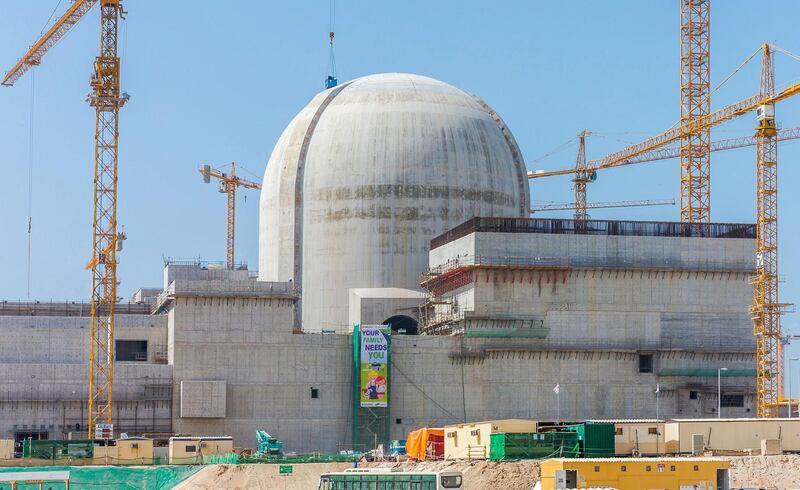The UAE is close to completing the nuclear power infrastructure needed to start the Barakah plant, international atomic energy experts have said.
A ten-person team from the International Atomic Energy Agency has been in the country since June 24, conducting an “integrated nuclear infrastructure review”. The results were announced on Sunday.
The team assessed areas for improvement across 19 segments including the electrical grid, emergency planning, nuclear security, radioactive waste management and environmental protection.
“The visit is not a rubber stamp but supports UAE efforts," said Milko Kovachev, head of the IAEA nuclear infrastructure development section, who led the team.
“We were pleased to see the status at the moment and, more importantly, to see clear plans to go forward," he said.
It is not an official audit, but the team made several recommendations including three on radioactive waste, long-term sustainability and operational readiness for the UAE’s peaceful nuclear programme, which regulators said they would implement.
The Barakah plant in Al Dhafra is a joint venture between Emirates Nuclear Energy Corporation and Kepco, the Korean Electric Power Company. It is being run by the Nawah Energy Company, who cannot begin operations until it has received a licence from the Federal Authority for Nuclear Regulation.
In May, it was announced that the first reactor would not begin generating electricity until 2019 or 2020 as work continues. It’s envisaged that four reactors will eventually generate 25 per cent of the country’s energy needs.
_______________
Read more:
UAE's first nuclear power plant delayed until late 2019 or 2020
Handover of Barakah nuclear plant to operator 'almost complete'
UAE is 'role model' for peaceful nuclear power says energy chief
_______________
On nuclear waste, meanwhile, the team said the UAE should approve the draft 2016 policy to enshrine its commitment to responsible radioactive waste and spent fuel management. Turning to operational readiness, it said Nawah needs to complete training and certification of all key personal, implement preparations for maintenance before the plant begins operating and that Enec maintains its oversight role during construction of units 3 and 4. Thirdly and finally, the team advised that the UAE ensures the long-term sustainability of the nuclear power programme. Establishing a research and development programme is one way of doing this, it said.
Raoul Awad, deputy director general of operations at FANR, said the team's review had validated their work and all the recommendations would be implemented. "They will be completed before the start of the reactor," he told The National.
On the tentative opening date of late next year or early 2020, Mr Awad said FANR never prioritises the schedule over the safety and security of the facility.
“This is the main mantra of any good regulator. But I don’t see any reason to doubt that will be the right schedule.”
The IAEA team also praised the self-assessment carried out by Nawah and development of a strong engineering unit within the company.
The IAEA work is done in three phases. The first phase involves pre-project activities, while the second involves preparatory work for the contracting and construction of a nuclear energy plant. The UAE was evaluated by the IAEA mission team on these two phases in 2011.
The final and third phase involves activities to implement the first nuclear energy plant.
Hamad Al Kaabi, the UAE’s permanent representative at the IAEA, said the progress made by the UAE’s nuclear energy programme was a result of the collaboration with a network of international organisations.
“The successful conclusion of the phase 3 … mission is a testament to the UAE’s commitment to upholding the highest international standards of safety, security and transparency as we approach the commissioning of the nation’s first nuclear energy plant.”
Construction of the $25 billion nuclear plant began in 2011, with electricity generation originally slated for 2017.







